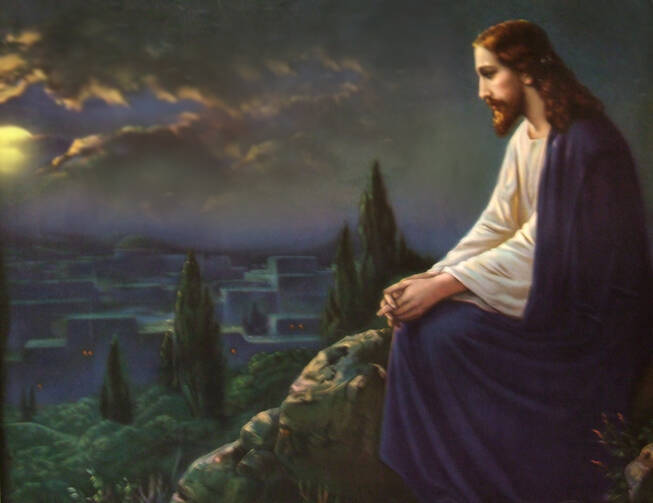The poem doesn’t require explanation, though some might be surprised to hear such a somber sound from Robert Frost.
Deep in the night, most of us desire only sleep, “nature’s soft nurse” as Shakespeare said. Denied that, rolling in bed, searching for the position that brings slumber, we can’t help but to join Job, thinking ourselves accursed.
The mind won’t surrender. It brings the day’s cares to bed and can’t let go. A pharmaceutical industry exists to offer slumber, but sometimes, we follow Frost. We engage the night, looking out of our windows, listening to the silence of the house, maybe even going for a walk.
Since the night will not let us go, we ask what it wants of us. My family has a picture of Jesus, doing the same. Painted by Josef Untersberger, in the early twentieth century, it’s entitled, Christus am Olberg. I’ve seen it in many other homes. Christ sits above the city of Jerusalem, at peace with the night. Pondering the day? Praying? Probably all of that. Mark’s Gospel records him doing the same.
Sleep is God’s soft, sweet grace. To lose it is surely to suffer. Yet even if we do not choose the restlessness, sleep’s loss is something that we can offer to God. We can ponder the day. We can pray. In the long hours of the night, the many years of life have a way of contracting. If we are graced, we might glimpse our lives from the heights.
In the Third Spiritual Alphabet, a work on prayer by the Franciscan Francisco de Asuna, Saint Teresa of Avila, for example, would have read:
Most of us are not ascetic Franciscans or Carmelites, seeking to offer suffering, or the absence of sleep, to God. But it is something we can offer. All those Gospel calls about staying awake aren’t simply metaphors. Yes, night is for sleep, but it’s also when lovers wake.
Job 7: 1-4, 6-7 1 Corinthians 9: 16-19, 22-23 Mark 1: 29-39








